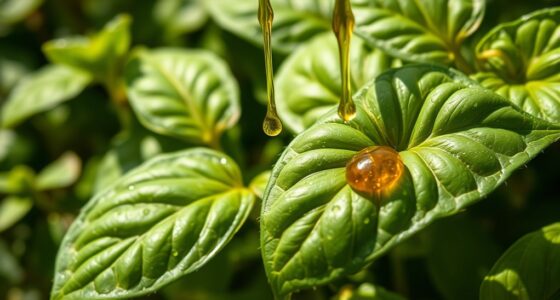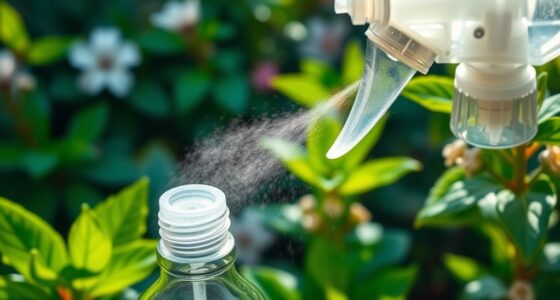To effectively control pests organically, encourage beneficial insects like ladybugs and lacewings, which naturally prey on pests. Use homemade sprays from garlic, neem oil, or hot peppers to repel unwanted invaders. Practice crop rotation and plant companion crops like marigolds and basil to deter pests and disrupt their life cycles. Reduce chemical use to protect beneficial insects and foster ecosystem balance. Explore these methods further to discover more sustainable solutions for a healthier garden.
Key Takeaways
- Introduce beneficial insects like ladybugs and lacewings to naturally reduce pest populations.
- Use homemade sprays with garlic, neem oil, or hot peppers as effective organic repellents.
- Implement crop rotation and companion planting, such as marigolds and basil, to prevent pest infestations.
- Minimize chemical pesticide use, focusing on natural methods that protect beneficial insects and soil health.
- Support pollinators like stingless bees to enhance ecosystem balance and improve pest control naturally.

If you’re looking for safe and effective ways to manage pests in your garden, organic pest control methods offer a natural alternative to chemical solutions. These approaches focus on working with nature rather than against it, helping you maintain a healthy, thriving garden without harmful residues. One of the most effective strategies involves encouraging beneficial insects. These natural predators, such as ladybugs, lacewings, and parasitic wasps, target common pests like aphids, mites, and caterpillars. By providing habitats, planting diverse crops, or purchasing beneficial insects from nurseries, you can establish a balanced ecosystem that keeps pest populations in check. This reduces your reliance on chemical pesticides, which can harm beneficial insects and disrupt your garden’s natural harmony.
In addition to introducing beneficial insects, using natural repellents plays a key role in organic pest control. Natural repellents include a variety of homemade or commercially available solutions that deter pests without harming plants or the environment. For example, a simple spray made from garlic, neem oil, or hot peppers can create a barrier that pests find unappealing. These repellents work by masking plant scents or irritating pests’ senses, discouraging them from feeding or laying eggs. Regular application, especially during peak pest activity, can considerably reduce infestations. Unlike chemical repellents, natural options are biodegradable and safe for humans, pets, and beneficial insects, making them a sustainable choice for organic gardening.
Another beneficial practice is crop rotation and companion planting, which naturally deters pests by disrupting their life cycle and confusing them with diverse plant signals. For instance, planting marigolds near vegetables can repel nematodes and aphids, while basil alongside tomatoes can reduce tomato hornworm and mosquito populations. These methods not only help prevent pests but also improve soil health and plant vigor. When combined with the use of beneficial insects and natural repellents, crop rotation and companion planting form a thorough approach that keeps pests under control without synthetic chemicals. Additionally, supporting stingless bees in your garden can enhance pollination and overall plant health, further contributing to a balanced ecosystem.
Frequently Asked Questions
Are Organic Pest Control Methods Safe for Pets and Children?
You’re probably wondering if organic pest control methods are safe for pets and children. The good news is, many organic options prioritize pet safety and offer effective chemical alternatives. These methods typically use natural ingredients, reducing risks of toxicity. Always read labels carefully and follow instructions. By choosing organic pest control, you’re taking a safer approach that minimizes harmful exposure, keeping your loved ones and pets protected while managing pests effectively.
How Long Does It Take to See Results From Organic Pest Control?
Timing expectations tap into your patience—seeing results from organic pest control varies. Typically, you might notice visible results within a few days to a week, especially with targeted treatments. Factors like pest type, infestation severity, and application accuracy influence how quickly you see success. Stay consistent and vigilant; organic methods often take longer but deliver safer, sustainable solutions. Trust the process, and you’ll eventually witness the wonderful, weed-free, pest-free progress.
Can Organic Methods Eliminate All Types of Pests Effectively?
You might wonder if organic methods can eliminate all pests effectively. While they handle many pest types, their success depends on pest diversity and method limitations. Organic approaches, like neem oil or beneficial insects, often work well but may not fully eradicate pests in severe infestations. You’ll need to combine methods or seek professional advice for persistent or diverse pest problems. Organic control is effective but not always a one-size-fits-all solution.
Are Organic Pest Control Solutions Cost-Effective Compared to Chemical Options?
When comparing organic pest control solutions to chemical options, you’ll find the cost comparison varies based on your budget considerations. Organic methods often have higher upfront costs but can save money long-term by reducing chemical use and environmental impact. If you prioritize eco-friendliness and sustainability, organic solutions are worth the investment. However, if immediate, budget-friendly results matter most, chemical options may seem more affordable initially.
Do Organic Methods Require Repeated Applications for Lasting Protection?
Persistent pest problems often require repeated applications to maintain protection, and organic methods are no exception. You’ll find that application frequency plays a vital role in achieving long-term effectiveness. Regular treatments, combined with integrated pest management, help keep pests at bay and guarantee lasting results. While organic solutions may need more frequent use initially, their eco-friendly nature makes them a sustainable, safe, and effective choice for ongoing pest control.
Conclusion
By embracing these organic pest control methods, you’re planting seeds of harmony in your garden’s future. Think of each natural solution as a guardian, standing watch to protect your crops without the scars of chemicals. As you nurture these eco-friendly practices, you’re cultivating a vibrant ecosystem where pests are just passing shadows, and healthy plants flourish like a resilient forest. Remember, your garden’s health mirrors your care—tend it with patience, and nature will reward you in full bloom.









